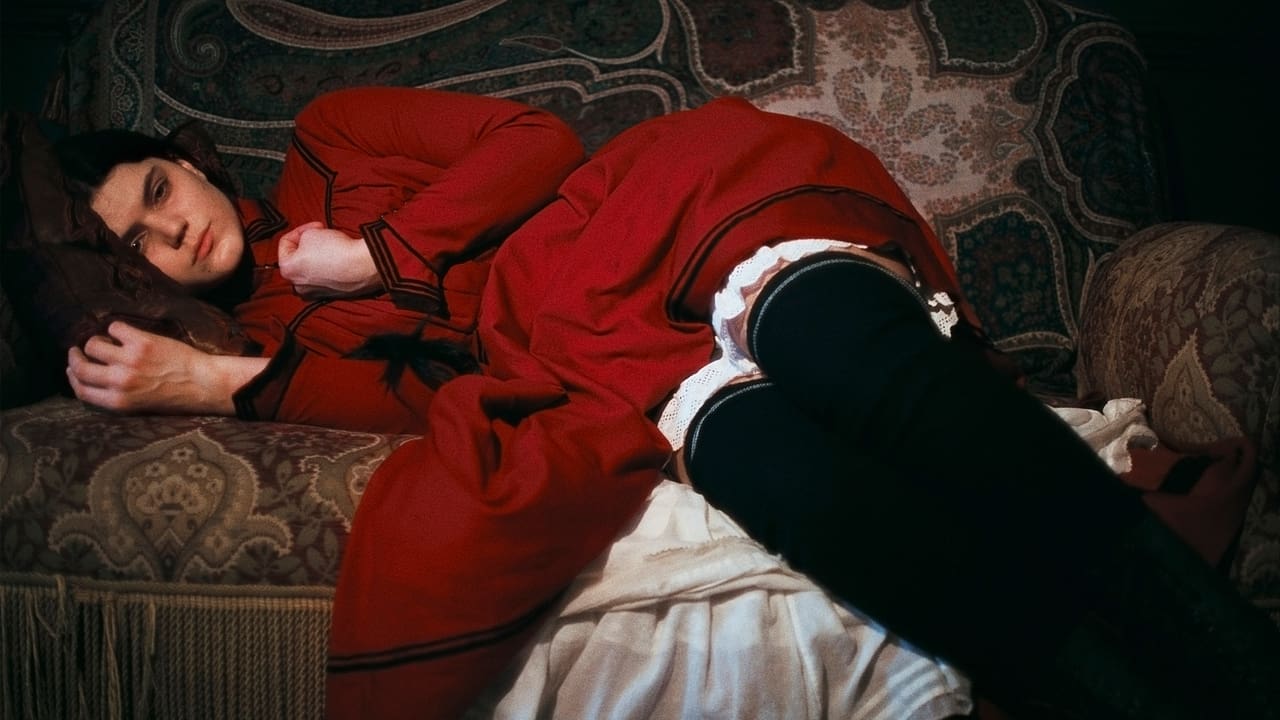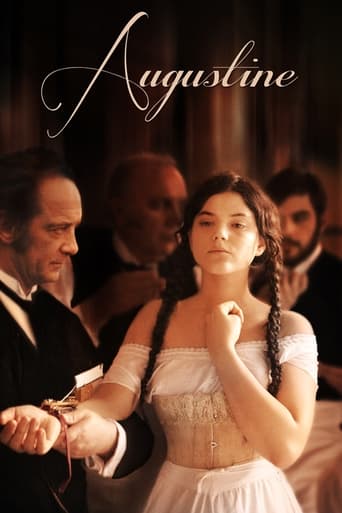

Amateur movie with Big budget
... View MoreAm i the only one who thinks........Average?
... View MoreI gave this film a 9 out of 10, because it was exactly what I expected it to be.
... View MoreGreat story, amazing characters, superb action, enthralling cinematography. Yes, this is something I am glad I spent money on.
... View MoreThis is rather a sensationalised and eroticized rendition of filmmaking loosely based on facts.Although well acted, well filmed and very intriguing throughout, it nonetheless did not treat the subject material in a way that fully depicted what countless many young women of the day endured: early sexual abuse and it's life-harming effects.One of the factual details that is notably absent from Winocour's film is the sexual assaults the young Augustine suffered at the hands of an employer with whom she was placed by her mother at age thirteen. The details of her rape do not get mentioned and neither does her trauma,or the information that the attacks began soon after.From the symptoms of her 'illness,' in this film, the causes or triggers for Augustine's episodes often feature in scenes of animal cruelty. The film does not treat her history of sexual abuse and it has Augustine enter the Salpêtrière at age nineteen, while, in fact, she was fourteen when she began her stay. Very much younger. Still a child.If the filmmaker had stuck to a factual rendition of how so many girls were sold or traded or sent off to work in situations where they were never protected, never able to protect themselves and where the theme of the day in most of Europe was early sexual abuse of horrific proportions, there may have been a film that explained how generationally women have been exploited, manhandled, marginalised and mistreated almost as point of course.A hugely wasted opportunity to make an important film.
... View MoreFrench screenwriter and director Alice Winocour's feature film debut which she wrote, is inspired by medical records regarding a French 19th century neurologist, who bestowed the eponym for Tourette Syndrome on behalf of his student named Georges Gilles de la Tourette, and his relationship with a patient. It premiered in the International Critics' Week Special Screenings section at the 65th Cannes International Film Festival in 2012, was screened in the Discovery section at the 37th Toronto International Film Festival in 2012, was shot on location in France and is a French production which was produced by producers Emilie Tisne and Isabelle Madeleine. It tells the story about a woman named Augustine whom after having a severe seizure in the house where she and her cousin named Rosalie is working, is sent to the Hospital De La Salpêtrière in Paris, France and told that she will have to stay there. At the same time, a professor at the hospital is studying a disease called hysteria. Distinctly and subtly directed by French filmmaker Alice Winocour, this finely paced and somewhat fictional tale which is narrated mostly from the two main characters' viewpoints, draws a refined and increasingly intriguing portrayal of a young woman whom after experiencing another one of her strange seizures at a modernized psychiatric hospital catches the attention of a prominent French neuroscientist who lives with his wife named Constance and their pet named Zibidie and who immediately begins examining her. While notable for its distinct and atmospheric milieu depictions, sterling cinematography by cinematographer Georges Lechaptois, production design by production designer Arnaud De Moleron, costume design by costume designer Pascaline Chavanne and use of colors and light, this narrative-driven story about coming-of-age, how hysteria was perceived in France at that time and particularly how this affected women who were those most likely to be suspected of having and being diagnosed with this mental illness, depicts two dense studies of character and contains a great and timely score by English composer Jocelyn Pook. This historic, austere, modestly erotic and consistently involving period drama and chamber piece which is set during a winter at an institution for women with variegated mental conditions in the capital city of France in the late 19th century and where a nineteen-year-old French kitchen maid whom is praying to be cured becomes infatuated with the person she believes can cure her and a middle-aged man named Jean- Martin Charcot whom is looking for funding from an academy finds a rare patient who might convince them to support him with his studies, is impelled and reinforced by its cogent narrative structure, subtle character development and continuity, poignant instrumental tones, scenes between Jean-Martin and Augustine and the reverent acting performances by French actor Vincent Lindon and French actress and musician Soko. An eloquently atmospheric, distinctly cinematographic and brilliantly romantic mystery and a whole-heartedly executed directorial debut.
... View MoreMaybe not worth an Oscar nomination, but the French singer SoKo did a great job with this role (not unlike the young actress, Quvenzhané Wallis, who did a great job in an otherwise a painfully flawed "Beast of the Southern Wild"). "Augustine" does a great job of highlighting the attitudes and practices that existed during the 19th century as psychiatry was trying to become a science. And as backward and ignorant as the beliefs of Charcot will appear to many, who lack a sense or knowledge of history, it is even sadder to think that Charcot was actually a genius compared to most of the people of his era, and that he was a definite improvement over the entire rest of human history that preceded the 19th century. At least Charcot tried to break out of the ignorance that enveloped (and still envelops much of) humanity when it comes to the "mentally ill" and the epileptic. The worse part of the movie is the ending, that final encounter between Charcot and Augustine after Charcot's presentation of Augustine to a group of French scientists; it just didn't make sense. But overall "Augustine" is better than average...and nowadays that's a lot since even better-than-average films are so rare.
... View More**SPOILER FREE***I couldn't write this entire review without spoilers but I'll write a short one without any. This is the story of Augustine, a 19 year-old woman who is sent to an asylum because she has crises and is apparently 'possessed.' She is treated by Charcot (Vincent Lindon) who was a real french doctor who worked with hypnosis to treat hysteria and made several advances in the field of Parkinson and sclerosis. Here however, Charcot's skills seem mostly to take off girl's clothes. Nothing is said about what Charcot really does or why he does it. He uses hypnosis to observe Augustine's crises but he doesn't really seem to care for the other patient. He quite obviously wants to sleep with Augustine and has a really nice monkey at home. That's what I walked away from. The film itself would have been quite good if not for major plot holes. Vincent Lindon whom I love, was quite fantastic in this, as usual, as was the girl playing Augustine. It seems the film is going somewhere until the very end when you realize it really isn't. It's too bad because, because Augustine was 'almost' a very good film. ***SPOILERS***Augustine, following one of the biggest crisis is left with paralysis on her right side (it seems she can still move however, but she can't open her eye and she can't feel anything.) She is obviously sexually repressed and at age 19, still doesn't have her period. Charcot writes in his diary that she is starting to feel better. She had a dream that animals were being bled and now she has her period! Like magic, because Charcot really didn't do anything in the film, as far as we're aware. Then she has another crisis and the paralysis moves to her left side. But she can still move everything except for her arm. Charcot undresses her a few times and decides he wants to present her to the academy to get more funding. But just before the presentation, she falls down the stairs and can move her arm! So she decides that she is healed (even though her main issue was her recurring crises) and she fakes a crisis at the academy, going all out to touch herself while looking Charcot in the eye. Huge sexual build up of course, so Charcot leaves everyone at the academy to go have sex with Augustine and then he lets her escape the asylum. So what is the morale of the film? No one realized just because her paralysis is temporarily gone doesn't mean she is healed? Was she just so horny it caused her not to move? They had really good substance and wasted it to make this film a sexual affair between Charcot and Augustine. I did still enjoy the film beyond that, I am disappointed.
... View More